- Philip Norman’s “letter” to Paul - May 2, 2016
- The Jets and The Beatles - April 25, 2016
- Lennon and McCartney On The Tonight Show, 1968 - April 20, 2016
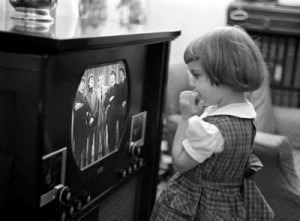
I really don’t remember when I first saw the Beatles. I have no memory of a ‘before’ and ‘after.’ I think I must have issued from the womb with them firmly attached, like a birthmark.
I’m a first-generation Beatles’ fan, born in 1956, which makes me a younger cohort of the boomer generation. According to Sociologist and Beatle Expert Candy Leonard, “screaming teenage girls got a lot of attention in 1964 and they’re the ones immortalized in the black and white footage, but the largest number of first-generation Beatle fans were actually boys and girls between five and 10 years old — boomers born in the mid-to-late 1950s.” We responded to Beatlemania the same way as our older siblings, but the impact was more significant. Let me explain how.
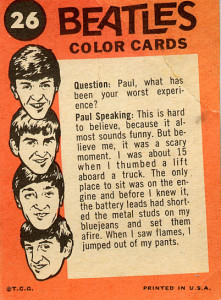
Backside of a coloured Beatle card
Beatlemania turned us into consumers. By the time I was eight years old, I had every record, every magazine, and an impressive collection of Beatle trading cards. I got my hair cut in a Beatle bob and wore Beatle sneakers. Like my peers, I was a walking advertisement for Beatlemania. In my age group, self-directed consumerism was virtually unheard of before 1964.
The Beatles changed the trajectory of our childhoods, displacing, as Leonard notes, our usual childhood past-times. My best friend and I stopped playing house and started ‘playing Beatle’. She was Paul, I was John. We spoke in fake Liverpudlian accents and ran from fake fans. (Once we even stuffed her younger sister into a doll stroller and took her around the neighbourhood, pretending she was baby Julian. The kid wasn’t impressed.) On any given Saturday afternoon, you’d see us with all the other neighbourhood kids, lined up in a row on my friend’s porch playing air guitar: an assortment of John’s and Paul’s in varying sizes and ages (no George’s or Ringo’s, for some reason), imitating our heroes. By the end of 1964 we all wanted guitars–and I got mine, an inexpensive acoustic model which, unfortunately, I never learned to play. (Like Paul, I’m left-handed, but unlike Paul, I have no talent). We were still children, but our interests and passions were now more closely aligned with our teen-aged siblings.
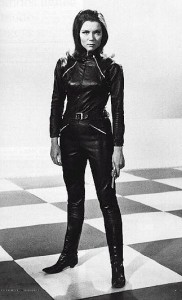
Emma Peel, looking bad-ass.
The Beatles became our role models. Because of their androgynous appeal, ‘playing Beatle’ helped us believe that, as girls, we could become something other than wives and mothers. The enormous popularity of the Beatles made room for the appearance of bolder, stronger female archetypes, like the bad-ass, fictitious crime fighter Emma Peel. We were no longer stuck with misogynistic caricatures of women, like Ian Fleming’s Pussy Galore (like, seriously, Fleming?).
To say that the Beatles had a positive influence on my youth would be the mother of all understatements. And with George Martin’s passing, I’m reminded even more. Martin took four rough diamonds, polished them up and made them shine. Thank you, George Martin, and thank you, Beatles, for the childhood you gave me. May you all shine on.

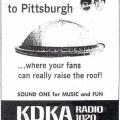
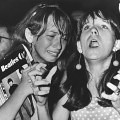
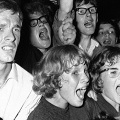
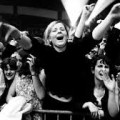
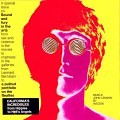
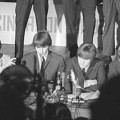
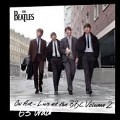
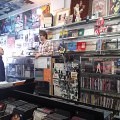
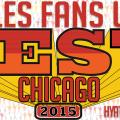
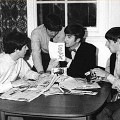
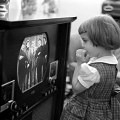
“She was Paul, I was John. We spoke in fake Liverpudlian accents and ran from fake fans. Once we even stuffed her younger sister into a doll stroller and took her around the neighbourhood, pretending she was baby Julian.”
Can I just say? This image totally made me day! I’m still laughing…
🙂 Kids are so nuts, eh? Glad to put a smile on your face.
Me and my crew got “beatle” haircuts too. They were surprisingly cute.
Ha–I think everyone did, although my particular cut was more of the Buster Brown variety. 🙂
My sisters and I got “beatle” boots. So stylish. And our attempts at english accents, was a mess. High posh “queen’s/cockneyish sounding scouse/smothered in southern fried “Okie”/black dialect.
I was the youngest, my oldest sister was left handed, but if we played Beatles, I wouldn’t have been anybody but Paul.
Your accent description is hilarious, Water Falls! I find it so interesting to hear your stories.
Another thing. When me and my sisters were kids, we just couldn’t understand the stereotype of women that were portrayed on tv and in the movies. The whole damsel in distress that was so prevalent. They’d have a woman, who’d be fortunate to have a “hero”, a man, trying to save her from harm, but instead, he was getting his ass kicked, while she is standing by watching, sighing, meowing and cowering, instead of trying to help the person rescueing her, by finding something to knock the shit out of “the bad guy” so she and her shining knight can both be saved. We loved Diana Rigg as Mrs Peel, the butt kicking fighting babe, who was hardcore. Kinda like Olivia Harrison, when George got stabbed by the “crazy”, Olivia used the business end of a vase or lamp on him. And Linda McCartney in Nigeria, when she and Paul were approached menacingly by robbers, Linda, terrified and crying, jumped in front of Paul screaming “Beatle Paul!”
The robbers looked and recognized world famous Paul and only took recordings, equipment, small loot and left them alone instead of God-knows-what! (I realized the robbers STILL could’ve done worse, BUT THEY DIDN’T!..probably because they didn’t want the shitstorm that would have descended upon themselves if they’d done worse. My point being that, women started being portrayed a bit more inclined to fight back at danger, instead of heaving their breasts and cowering in fear, and that trend started in the sixties.
We can blame the `50’s for that. Woman were gaining a foothold in the 40’s (just have a look at how women were portrayed in Hollywood–strong, independent, able to defend themselves) but were put firmly back in their place in an effort to re-integrate the menfolk back into society when they returned from the war. Rosie the Riveter was suddenly incapable of doing anything other than make meals and babies (not necessarily in that order.)
I love SO MUCH that we all identified with the Beatles themselves, and didn’t role play as, say, peripheral ladies orbiting the menfolk. That says as much about the Beatles as it does about us, I think. 🙂
Agreed. It’s funny to me that Candy Leonard spoke of girls imitating the Beatle women, at least in terms of looks. That may have been true of older fans, but in my experience wasn’t true of the younger ones. Who wants to be a Beatle wife when you can be a Beatle?
Something I saw on Twitter today:
“In the 1960s men said the Beatles were a joke because teen girls liked them and now they say teen girls are a joke because they don’t.”
Not sure if that’s 100% true, but the quote jumped out at me for some reason…
I find it kind of fascinating that there are so many young fans now, and they have the same reaction to the Beatles as the fans from 50 years ago. Someone ought to write a book…. 😉
“Paul is left handed”. This is a common misconception. Although Paul plays guitar and bass with “left handed” instruments he is in fact a right handed person. For example many left handed people play “right handed” guitars”. This doesn’t make them right handed. Ringo is left handed but he uses a right handed kit… Another example is Paul Simon who is left handed but plays right handed guitars.
I want to recant. I had read in what were supposed to be reliable sources that Paul was right handed but only played guitar left handed. While this is possible I watched some videos of Paul signing autographs and he uses his left hand. My bad. Paul is a lefty or south paw.